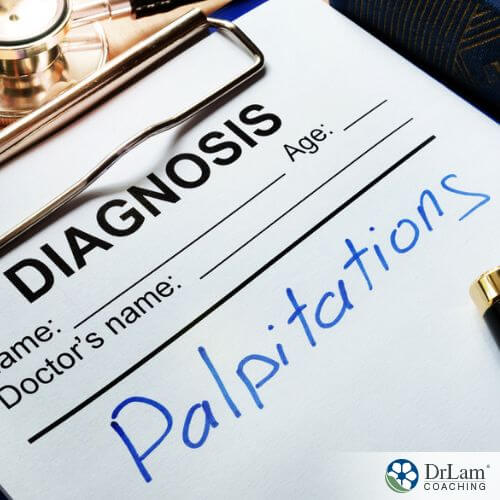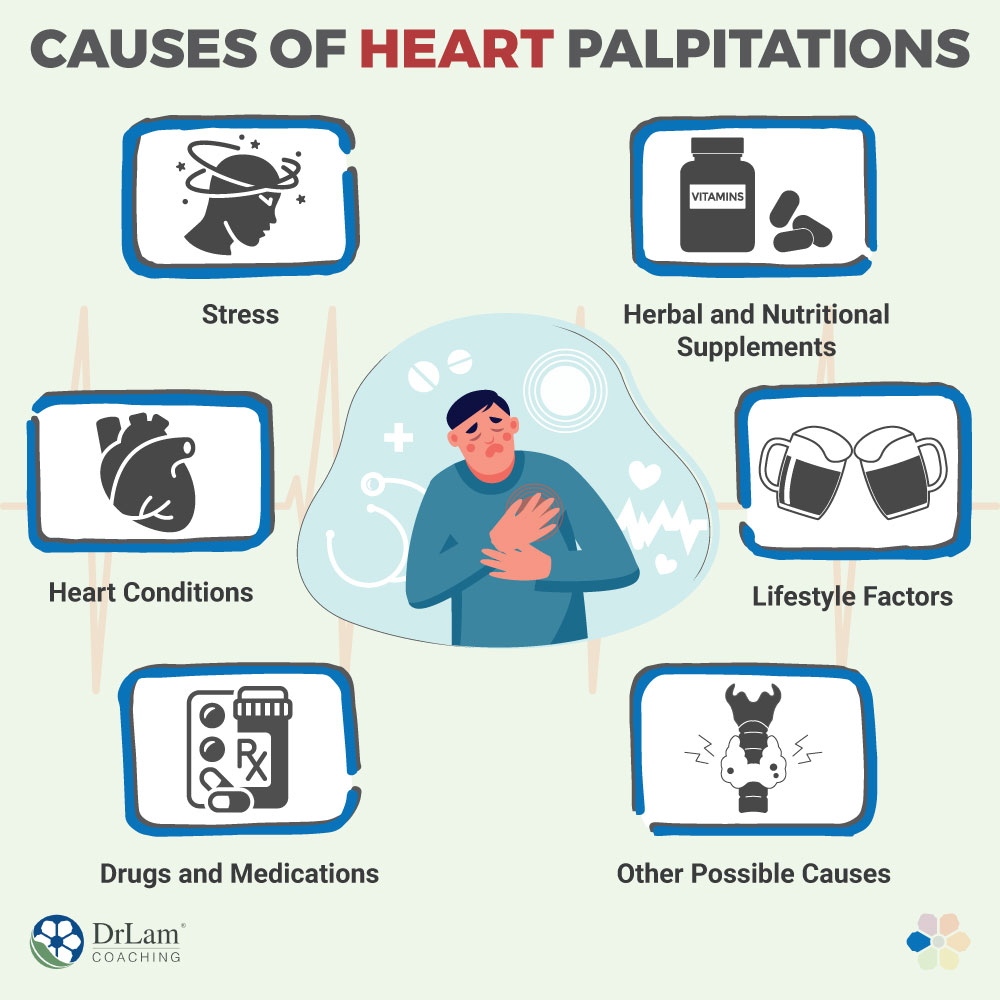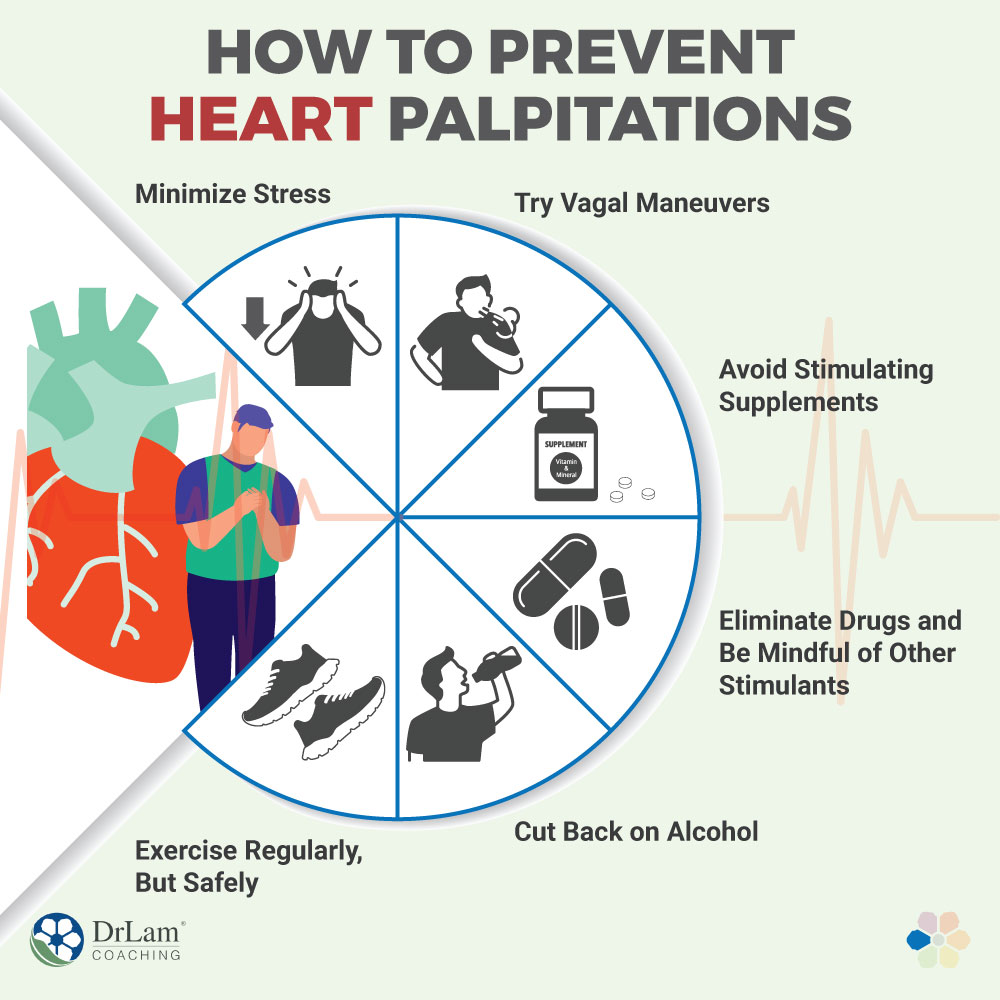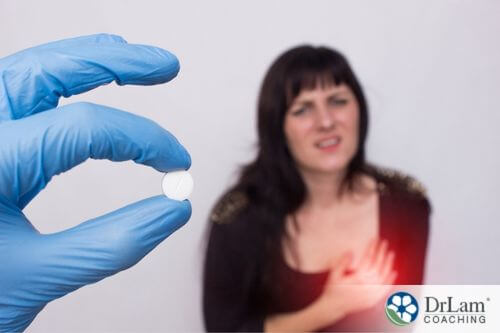 Heart palpitations can be experienced by individuals differently and can be perceived as the heart fluttering, skipping a beat, slowing down, murmuring, racing pulse, throbbing, flip-flopping, or pounding. For some people, palpitations can be alarming and bothersome, but mostly, they tend to be harmless. However, they can be signs of a serious health condition, like arrhythmia. Frequent palpitations or those lasting beyond a few quick seconds should not be ignored. By understanding heart palpitations, you can learn how to remedy and prevent them.
Heart palpitations can be experienced by individuals differently and can be perceived as the heart fluttering, skipping a beat, slowing down, murmuring, racing pulse, throbbing, flip-flopping, or pounding. For some people, palpitations can be alarming and bothersome, but mostly, they tend to be harmless. However, they can be signs of a serious health condition, like arrhythmia. Frequent palpitations or those lasting beyond a few quick seconds should not be ignored. By understanding heart palpitations, you can learn how to remedy and prevent them.
Firstly, most heart palpitations are harmless.
But you should seek immediate medical attention if you experience:

The causes of heart palpitations include emotional issues, medical conditions like heart disease, medications, drugs and stimulants, and even lifestyle factors. The cause can be disease-related or non-disease-related and sometimes the cause is unknown. More common causes of palpitations include:
An emotional trigger like stress can be the source of heart palpitations. Stress can be either acute or chronic, and chronic stress, in particular, can cause problems with your stress response. Stressors can be physical, like managing a chronic condition, situational, like confronting marital challenges, or psychological like dealing with depression. It could also be a symptom of Adrenal Fatigue Syndrome (AFS), which is caused by chronic stress and results in the overuse of the NeuroEndoMetabolic (NEM) stress response, keeping cortisol levels high.
Stress activates the Cardionomic circuit, which consists of the adrenal glands, the autonomic nervous system (ANS), and the cardiovascular system (CVS). It affects the brain, the adrenal glands responsible for stress hormone output, and the sympathetic nervous system(SNS) that regulates the “fight or flight” response as well, and can accelerate heart rate. This change in the body contributes to cardionomic imbalance for which palpitation is a symptom.
In some cases, heart palpitations can indicate an underlying heart condition, such as:
Heart palpitations can be triggered by certain drugs and medications. Medications like an asthma inhaler, thyroid and cough/cold medicines, diet pills, decongestants, antibiotics, anti-depressants, hypertension, heart disease beta blockers, and antiarrhythmic medications. Many decongestants, for instance, contain phenylephrine or pseudoephedrine, which are known to cause side effects that include irregular or fast heartbeat. Recreational drugs can also induce palpitations; cocaine, cannabis/marijuana, opiates, and methamphetamines can sometimes cause irregular heartbeat or increased heart rate.
Essential vitamins and minerals are beneficial for proper bodily function, but herbal and nutritional supplements, in excess or deficit, can cause heart palpitations. Some supplements that can cause palpitations include folate, vitamin B12, vitamin D, calcium, l-lysine, potassium, and magnesium. Vitamin D, for instance, taken in large amounts can cause palpitations, while a deficiency in folate and vitamin B12 can cause anemia and as a result, lead to palpitations.
 Lifestyle triggers that may cause heart palpitations can take different forms.
Lifestyle triggers that may cause heart palpitations can take different forms.
Palpitations may be noticeable with alcohol consumption, especially if heavy drinking is typical since this can lead to an increased heartbeat or irregular heartbeat.
A lot of people combine coffee and cigarettes, but the pairing of caffeine and nicotine can cause heart palpitations, which increases the heart rate and irregular heartbeat.
When a person exercises, the heart pumps faster to provide oxygen to the muscles, and vigorous/strenuous exercise, especially, can sometimes trigger heart palpitations, which is a good reason to get a doctor’s approval before starting an exercise program.
There are several other possible causes of palpitations, including:
A proper assessment of the cause of heart palpitations is necessary to distinguish between serious and harmless palpitations. It’s critical to separate palpitations brought on by stress, from those connected to supplement intake or underlying heart disease.
A doctor will begin the process with a physical examination using a stethoscope to listen to the heart, checking for signs of medical conditions that cause heart palpitations, and inquire about your medical history, diet, present medications, and lifestyle. Questions are typically asked about the frequency of the palpitations, their timing, and the situation under which they occur.
A basic blood test can help determine the cause of your palpitations, but sometimes a doctor may require specific tests to confirm that the palpitations result from a medical issue, like a heart condition.
Other tests can include:

Before a doctor can create a plan to address heart palpitations, the cause must be determined to establish the right approach. Therapy is not needed in many instances.
 Palpitations that are the result of a heart condition may require specific medications or medical procedures to remedy any heartbeat problem. A doctor may recommend antiarrhythmic medication, like beta blockers and calcium channel blockers to remedy heart rhythms that are too fast or irregular. Examples of specific medications that are sometimes used to remedy palpitations include Sotalol, a beta-blocker for irregular heartbeat, and Verapamil, a calcium channel blocker used to correct abnormal heart rhythm.
Palpitations that are the result of a heart condition may require specific medications or medical procedures to remedy any heartbeat problem. A doctor may recommend antiarrhythmic medication, like beta blockers and calcium channel blockers to remedy heart rhythms that are too fast or irregular. Examples of specific medications that are sometimes used to remedy palpitations include Sotalol, a beta-blocker for irregular heartbeat, and Verapamil, a calcium channel blocker used to correct abnormal heart rhythm.
Heart palpitations can be benign and not associated with any serious underlying medical condition. Their occurrence might be prevented with particular care to eliminate certain triggers and with lifestyle changes. Some steps that can be taken to prevent heart palpitations include:
Stress is a trigger for heart palpitations, making it critical to find ways to eliminate stressors, whether it’s family drama or financial troubles. Stress management can help you cope with stress.
Getting an adequate amount of sleep and sticking to a sleep routine can help calm the mind and body. Regular exercise can also help to keep stress at bay by increasing endorphin (“feel good” hormone) production, which helps to improve mood and positively impact the cardiovascular system. Stress can also be managed with relaxation techniques like meditation, tai chi, deep breathing, and yoga.
Vagal maneuvers are techniques or actions used to stop palpitations that are characterized by an abnormally fast heartbeat. The vagus nerve, which, in part, connects the brain to the heart is stimulated to help regulate a fast heartbeat. This can be done at home with a doctor’s approval.
A few techniques include chanting the word “om”, stimulating your gag reflex, or coughing. Another is applying a cold towel to the face, leaving it in place for 20 to 30 seconds so that the “shock” from the cold helps to stimulate the vagus nerve.
Beware of stimulating herbal and nutritional supplements that can cause palpitations. These stimulants have a tendency to increase heartbeat and negatively impact heart health by disrupting electrical signals. They can also cause the sympathetic nervous system to become overactive.
Nutritional supplements are often used as an alternative to traditional medications but it’s critical that the product is safe for consumption and overall health. Knowing how a particular supplement can impact the body in adequacy or deficiency can help people avoid palpitations.
For instance, low levels of magnesium or potassium in the body might be linked to heart palpitations, but increasing your intake of these supplements in such a case is beneficial for overall health. You should consult with your doctor before taking any supplements.
Identifying palpitation triggers is important to prevent occurrences because what may induce your palpitations may not be the same for another person. Stimulants like illegal drugs (amphetamines, cocaine, methamphetamine), caffeinated beverages (coffee, soda), cannabis and tobacco products, diet pills, and cough/cold medicines should be avoided if palpitations are noticeable with use. If you are a coffee lover, stick to decaf. Talk to your doctor if prescription medications appear to cause symptoms of heart palpitations.
 Heavy alcohol use can cause palpitations. Too much alcohol in the body is bad for the heart and can increase heartbeat or cause irregular heartbeat, and even impact the heart muscle. An excess of alcohol consumption can increase the risk of developing atrial fibrillation, a form of irregular heart rhythm that causes symptoms of palpitation. Not drinking or limiting alcohol intake leads to a healthier heart and as a result, steadier heart rhythm.
Heavy alcohol use can cause palpitations. Too much alcohol in the body is bad for the heart and can increase heartbeat or cause irregular heartbeat, and even impact the heart muscle. An excess of alcohol consumption can increase the risk of developing atrial fibrillation, a form of irregular heart rhythm that causes symptoms of palpitation. Not drinking or limiting alcohol intake leads to a healthier heart and as a result, steadier heart rhythm.
Boosting physical, emotional, and mental well-being is one of the benefits of participating in regular physical activity. Getting 20 to 30 minutes of moderate cardio activity each day can improve cardiovascular health and help to minimize the risk of palpitations.
Vigorous exercise could prove to be a health hazard since it’s known to trigger palpitations in some individuals. Some people may experience palpitations after vigorous exercise, with the heart beating much faster than normal.
Brisk walking, swimming, or a light 20-minutes jog is enough to improve heart health. The key is to not overdo exercise activities and cause palpitations. If working out causes palpitations, it’s a good idea to halt workouts and talk to a doctor before resuming.
Note, those with AFS should also avoid strenuous exercise, as it can cause an increase in cortisol that overtaxes the already depleted adrenals. Gentle exercise is best in this case.
Heart palpitations are harmless most of the time and require no medical care. However, in some cases, there are instances in which they signal a potentially critical medical condition. If you suffer from an underlying heart condition and are experiencing them, speak to your doctor. Get a proper assessment at your healthcare provider’s office if you are unsure about their cause.
If you are concerned about heart palpitations and would like assistance in determining natural ways to prevent them, the team at Dr. Lam Coaching can help. We offer a free** no-obligation phone consultation at +1 (626) 571-1234 where we will privately discuss your symptoms and various options. You can also send us a question through our Ask The Doctor system by clicking here.
Heart palpitations can be triggered by several factors, from an underlying medical condition to stimulating supplements. In some instances, the cause is unknown. Certain medications and preventative measures, like relieving stress or avoiding stimulants can help to remedy palpitations.
